

Niclas Ihrén
Good day. Niclas Ihrén is an independent expert on energy systems, sustainability and radical innovation. He cooperates with different think tanks, and he works with organizational processes around radical innovation and change. He is an advisor to Global Utmaning/Global Challenge, to the Tällberg Foundation, to the World Ecological Forum and to World Climate Solutions. Niclas Ihrén is the vice president of the guide and scout council in Sweden. He is the former CEO/COO of Globe Forum, a global sustainability business network, founder and CEO of the business incubator Innovation Council, founder and CEO of the globalisation consulting company Creatinity, former CEO of knowledge management company Infinity Learning. Mr Ihrén is a globalist and new thinker with broad expertise from international management and business transformation. He is a regular writer on sustainability issues and innovations, and he is an appreciated public speaker on sustainability, business innovation and market trends.
Future-Proof Your Education by Maria Andersen on Prezi. Esther Perel: The secret to desire in a long-term relationship. Consulting and method. Design. World Economic Forum - The Re-emergence of Europe. The Re-emergence of European e-Book by Klaus Schwab In his new book, The Re-emergence of Europe, World Economic Forum Founder and Executive Chairman Klaus Schwab examines the events that have led to Europe’s current challenging political and financial climate.
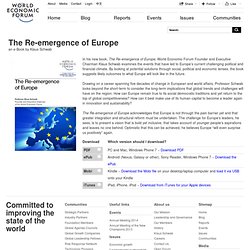
By looking at potential solutions through social, political and economic lenses, the book suggests likely outcomes to what Europe will look like in the future. Drawing on a career spanning five decades of change in European and world affairs, Professor Schwab looks beyond the short-term to consider the long-term implications that global trends and challenges will have on the region.
How can Europe remain true to its social democratic traditions and yet return to the top of global competitiveness? Big businesses risk losing out to social enterprises unless they adapt. A gathering of sustainability leaders hosted by Sir Richard Branson and Jamie Oliver has been warned that big businesses will be swept aside by emerging social enterprises unless they start changing their business models and contribute more to society.
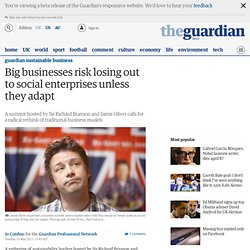
Boudewijn Poelmann, who founded the hugely successful Dutch Postcode Lottery, which now operates in Sweden and the UK, said that many major businesses would disappear over the next 20 years, to be replaced by emerging social enterprises, unless they took off their blinkers and responded to the environmental and social challenges the world is facing. "Small companies that are passionate about creating change will take over if big companies do not adapt," he said.
"We already see that with energy, with so many small companies producing sustainable clean energy. The big companies are already starting to feel they are losing out. " "Corporations have always been political animals. "I hope more foundations act like venture capitalists. OpenSpaceExplanations. Thumbtack - We can get you the right service pro. Welcome, niclas.ihren! (1) Who are TaskRabbit's major competitors. Försökskaniner i ett monetärt experiment. (7) The Guardian on Facebook. The Crisis Of Civilization. Vår psykologi får oss att strunta i offren för klimatförändringarna - Artikel av Billy Larsson. Food security needs systemic change – Blog. Food security needs systemic change I don’t know about you, but the closest I ever got to a Rubik’s Cube, shortly after it was first launched in 1974, was to handle one in a toy store.

For me, it seemed insoluble – and many assumed it was, until persistent cubers discovered not just one way to crack the puzzle, but many. And the cube came to mind as I thought recently about the astonishingly complex global security challenge we now face. Back in the seventies we were challenged by a series of energy (or at least oil) crises, but now we see the energy security issue linking ever more tightly to food security, water security, climate security and so on. All in? In this seminar, Scott Barrett discussed, by using analogies from poker, the dilemmas of collaboration versus protecting individual interests.
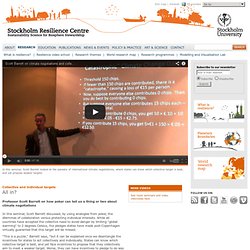
While all countries have accepted the collective need to avoid danger by limiting "global warming" to 2 degrees Celsius, the pledges states have made post-Copenhagen virtually guarantee that this target will be missed. "This is a puzzle," Barrett says, "but it can be explained once we disentangle the incentives for states to act collectively and individually. States can know which collective target is best, and yet face incentives to propose that they collectively aim to meet a weaker target.
Worse, they can have incentives to pledge to do less individually than is required to meet this weak collective target, and, finally, to do less than is required to fulfill even these weak promises. " About Scott Barrett Scott Barrett is the Lenfest-Earth Institute Professor of Natural Resource Economics at Columbia University in New York City. The Potential and Peril of Radical Innovation. Nobody likes the status quo.

Peer-to-peer production and the coming of the commons. Illustration: Andrzej Krauze ‘At a certain stage of development, the material productive forces of society come into conflict with the existing relations of production or – this merely expresses the same thing in legal terms – with the property relations within the framework of which they have operated hitherto.
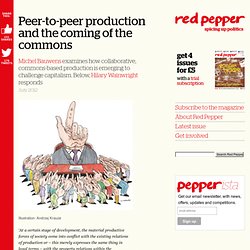
From forms of development of the productive forces these relations turn into their fetters. Then begins an era of social revolution. The changes in the economic foundation lead sooner or later to the transformation of the whole immense superstructure.’ Karl Marx, A Contribution to the Critique of Political Economy. Emanuele Campiglio - Towards an Ecological Macroeconomics. July 10, 2012 // By: Emanuele Campiglio A couple of weeks ago I attended the International conference on Ecological Economics, held in Rio de Janeiro just a few days before the Rio+20 UN Summit, where a few hundreds researchers have been presenting their work together with some high-level keynote speakers (Peter Victor, Mathis Wackernagel, William Rees, the Prime Minister of Bhutan, Ignacy Sachs and others).

One of the most debated topics during sessions and informal discussions seemed to be the one nef has been intensively working on lately, that is Ecological Macroeconomics (otherwise termed Macroeconomics of sustainability). The aim of this line of research is to give sound macroeconomic foundations to ecological/environmental issues, and more in general to include sustainability (including financial sustainability) into the macro picture. Victor’s work has become exceptionally popular among researchers interested in sustainability issues. Issues Macroeconomics, Energy & Climate Change. Principal value drivers. The principles of the circular economy offer not only a description of how it should work as a whole, but also an outline of specific sources of core economic value creation potential.

The economics and comparative attractiveness of different circular setups (e.g., reuse versus remanufacturing versus recycling) can differ significantly for different products, components, or types of material, whether in a specific geography or segment of the (global) supply chain—all of which we spell out in the next chapter. Nevertheless, there are four simple principles of circular value creation that hold true. Rock Climbing in France.
Chamonix - As well as the traditional mountaineering routes around Mont Blanc, there are many pure rock climbing routes particularly lower down in the valley, on fantastic Granite rock.

Enough fossil fuels to fry us all. George Monbiot said in a recent article that "We were wrong about peak oil.
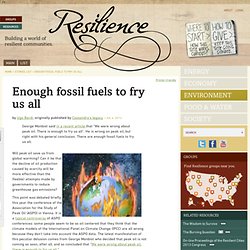
There is enough to fry us all". He is wrong on peak oil, but right with his general conclusion. There are enough fossil fuels to fry us all. Will peak oil save us from global warming? Can it be that the decline of oil production caused by scarcity will be more effective than the (feeble) attempts made by governments to reduce greenhouse gas emissions? World Energy Consumption - Beyond 500 Exajoules. The Death Of Peak Oil ? I mostly try to ignore George Monbiot's erratic twists and turns of opinion nowadays - the doomerish eco-socialism I can mostly tolerate but the flip flops on nuclear power and now peak oil are simply annoying - for someone who appears to be incredibly intelligent he doesn't appear to need much in the way of new information to change his tune - False Summit Peak oil hasn’t happened, and it’s unlikely to happen for a very long time.
A report by the oil executive Leonardo Maugeri, published by Harvard University, provides compelling evidence that a new oil boom has begun(9). The constraints on oil supply over the past ten years appear to have had more to do with money than geology. The low prices before 2003 had discouraged investors from developing difficult fields. We were wrong on peak oil. There's enough to fry us all.
The facts have changed, now we must change too. For the past 10 years an unlikely coalition of geologists, oil drillers, bankers, military strategists and environmentalists has been warning that peak oil – the decline of global supplies – is just around the corner. We had some strong reasons for doing so: production had slowed, the price had risen sharply, depletion was widespread and appeared to be escalating.
Science. Food. Sports. Art. Network tools. Pearltrees videos. Sustainability. News.